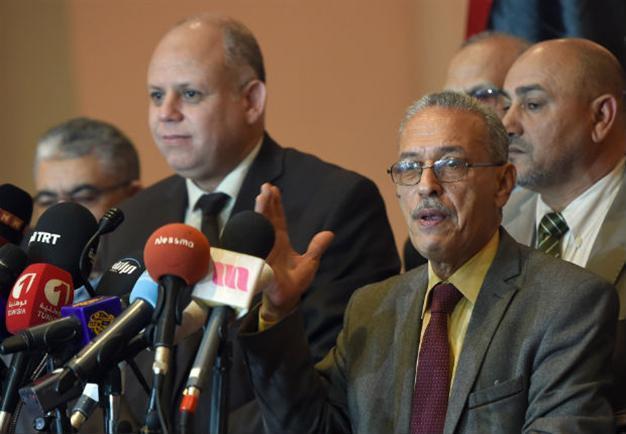Agreement reached on political solution to Libya conflict: Officials
GAMMARTH, Tunisia – Agence France-Presse

Ibrahim Fethi Amish (C) from the internationally recognised House of Representatives speaks during a press conference after signing documents with Awad Mohammed Abdul-Sadiq (L), the first deputy head of the Tripoli-based General National Congress (GNC), on reaching an agreement on ending the political deadlock in Libya following a meeting in the Tunisian town of Gammarth, on the outskirts of Tunis, on December 6, 2015. AFP photo
Warring Libyan factions meeting in Tunisia said on Dec. 6 they had reached an agreement to be approved by rival parliaments on ending the political deadlock that has plagued the country since Moamer Kadhafi’s overthrow.“This is a historic moment the Libyans were waiting for, the Arabs were waiting for and the world was waiting for,” said Awad Mohammed Abdul-Sadiq, the first deputy head of the Tripoli-based General National Congress (GNC).
GNC officials had been holding talks in the suburbs of Tunis for several days with delegates from the internationally recognized House of Representatives.
Abdul-Sadiq called on Libyans to support what he called “a historic opportunity.”
“If this solution receives real Libyan support -- from the people and institutions -- we will surely arrive in no more than two weeks or a month to a solution to solve the political crisis,” he told a press conference.
Amna Emtair from the GNC delegation told AFP the agreement would set up a new representative body that would choose a committee to nominate a prime minister within 15 days, while another committee would conduct a review of Libya’s constitution.
“It is a major breakthrough,” Emtair said.
Libya descended into chaos after the October 2011 ouster and killing of longtime dictator Kadhafi, with two governments vying for power and armed groups battling for control of its vast energy resources.
A militia alliance including Islamists overran Tripoli in August 2014, establishing a rival government and a parliament that forced the internationally recognized administration to flee to the country’s remote east.
Veteran German diplomat Martin Kobler took over the job of U.N. special envoy for Libya on Nov. 17, replacing Spaniard Bernardino Leon.
After almost a year of arduous negotiations, Leon in early October proposed a power-sharing deal under which Libya would be governed by a nine-member presidential council made up of a prime minister, five deputy premiers and three senior ministers.
But lawmakers from Libya’s internationally recognized parliament and its Tripoli-based rival balked at the deal and the names put forward by Leon.
In news conferences in Tobruk and Tripoli in his first week, Kobler urged politicians on both sides to rally around the deal proposed by his predecessor to set up a national unity government.
The latest announcement comes as experts and sources in Libya said that the Islamic State of Iraq and the Levant (ISIL) has strengthened its grip in its Libyan stronghold Sirte.
ISIL first appeared in Libya in 2014 when a group of Libyan ISIL fighters returned from Syria and reorganized in the port city of Derna, declaring eastern Libya to be a province of the caliphate.
Italian Foreign Minister Paolo Gentiloni said last week that Rome would host an international conference on Libya on Dec. 13, aimed at stopping the country from falling apart and containing ISIL.
















